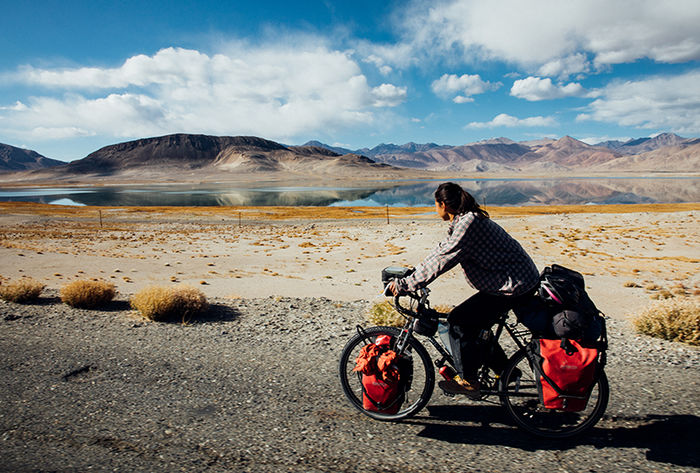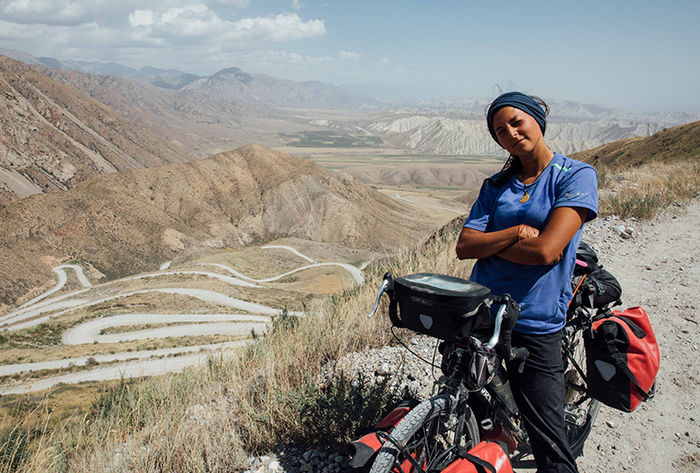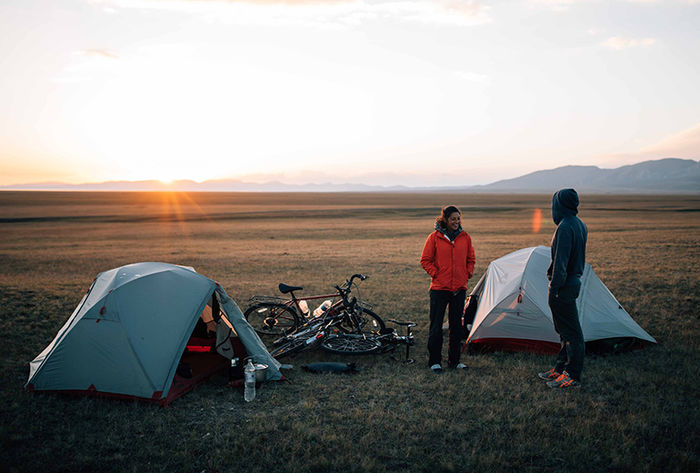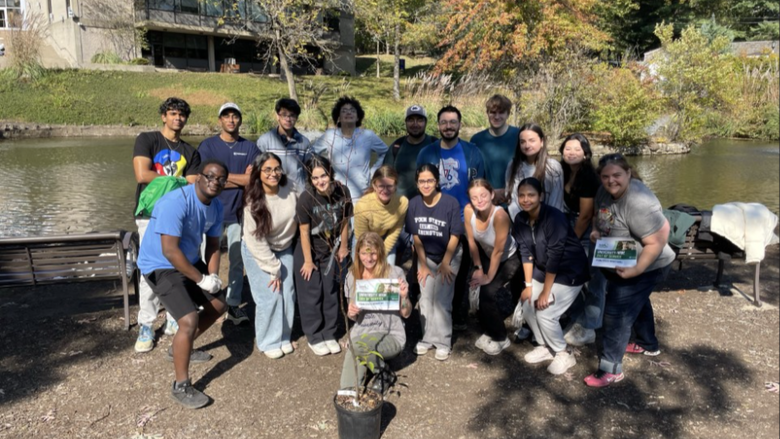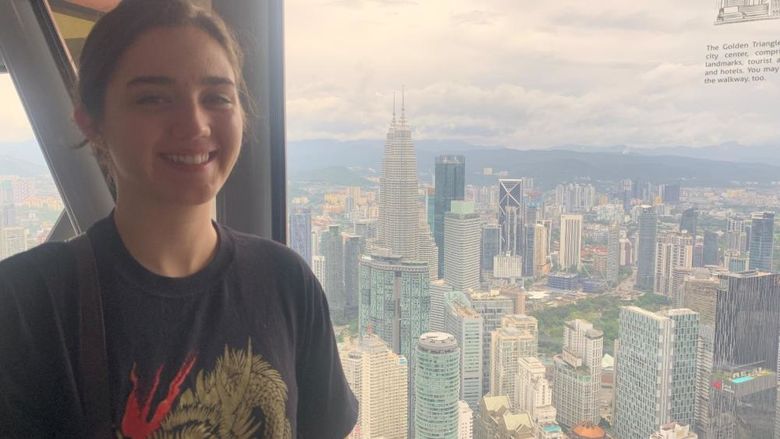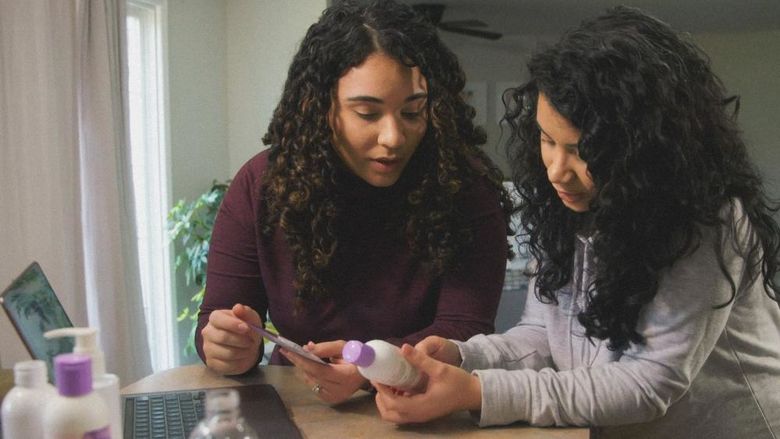
For Penn State alumna Nicole Heker, 2015, it’s the journey, not the destination.
She explains that it was a ‘journey of unlearning’ that originally took her from Penn State to Thailand. From there she moved on to Indonesia, to India, and back to Thailand – where she began 15-month solo bicycle excursion that ended in Portugal, passing through several other countries.
Along the way, Heker learned many things about herself and the world around her. She discovered that she wants to make a difference in the world and that working with children is one of her passions.
The purpose of Heker’s 6,351-mile solo journey on two wheels was to raise funds for Happy Kids Center, a nonprofit based in Nepal dedicated to helping children, where she now serves as director of development.
Heker’s story begins at Penn State. She began her education at Penn State Berks and completed her bachelor of arts in communication arts and sciences from the Bellisario College of Communications at Penn State's University Park campus. She said that she was inspired by experiences at both campuses – experiences that helped her to chart a course for her career and life.
At Penn State Berks, it was an Alternative Spring Break trip to Belize that whet her appetite for travel, adventure, and working with children. During the trip, Heker was part of a group of students who helped to revitalize a primary school. She also had the opportunity to spend time with the children – fueling a passion that led to her future career.
Around that same time, she enrolled in a Berks course on intercultural communications taught by Cheryl Nicolas, associate professor of communication arts and sciences (CAS). “That course is the reason I became a CAS major,” she stated. “It put into perspective my role in the tapestry of life.”
Later at University Park, it was the advice Professor Sam Richards gave at the end of a sociology course, that became her credo: “Unlearn everything.”
“I decided to separate from the nest. Within your family and within society, there are whispers about who you are. You only become aware of them when you step outside your comfort zone.”
And separate from the nest the Princeton, New Jersey, native did. She began her international adventures by accepting a one-year position as an English teacher in Thailand. Then her wanderlust began calling and she decided to backpack around Asia, which led to a job working on a boat in Indonesia. There, she met a couple who inspired her by what they were doing: traveling around the world and raising money for nonprofit organizations, including Happy Kids Center.
“Conditions were perfect at that time for me to consider doing something like this,” she explained.
She moved to India and joined the Happy Kids Center, located in the city of Bhaktapur, Nepal. The center was established in 2015, after Nepal was hit by a catastrophic 7.9 earthquake. It began as a semi-permanent bamboo structure designed as a safe haven for children to escape the devastation.
“There were a lot of things that I had to unlearn,” comments Heker, who added that she was very green when she began working with Happy Kids.
Then in 2016, Heker and her friend Ellen Carney, became the leadership team and officially founded Happy Kids Center as a nonprofit organization. Today, Happy Kids Center serves approximately 80 children, who range in age from 3 to 16 years old.
“We built programs that are running so well,” stated Heker. She goes on to explain that when she arrived, none of the kids were attending school; today 98% are enrolled in at least some classes.
The program that she is most proud of is ‘Kanya: String of Hope.’ The mission of this program is to prevent young girls from getting married. ‘Kanya’ is the Hindi word for ‘unmarried girl.’ According to the Happy Kids Center website: Child marriage is pervasive in South Asia. In this culture, a girl’s ‘value’ decreases every year after she hits puberty, and therefore the dowery – the money that the bride’s family pays to the groom’s family – increases significantly every year.
By teaching these young girls a vocation – how to make string jewelry – Happy Kids Center is able to pay them – money they use to help support their families. The center sells the jewelry, and all the profits go to the girls.
Despite programs like Kanya: String of Hope, the Happy Kids Center needed to raise operating funds. As director of development, and inspired by the couple she met in Indonesia, Heker had the idea to turn a long-distance bike excursion into a fundraiser. She adds that she also wanted to take a journey that was challenging.
When planning her route, she chose areas that were familiar to begin and end the journey. Having taught in Thailand and studying abroad in Spain, she mapped her course, which started in the northern Thai city Chiang Mai, and ultimately ended in Lagos, Portugal.
Heker states that she wanted to travel by bicycle because of the spontaneity it offered. Although she knew how to ride, she never owned her own bike before the trip, so she was not familiar with the mechanics. The first day she rode with her gear – which included camping equipment, a bike repair kit, clothes, a mobile phone, a Kindle and a ukulele – was the first day of her trip. She explained that she was afraid she would change her mind if she practiced with the weight of the gear.
Although Heker was determined to begin and end the one-and-a-half-year journey on her own, she did make friends along the way, including a photographer she met in Mongolia who is now one of her best friends.
During the excursion, she navigated every type of terrain, from paved highways to gravel roads, to dirt trails. She pedaled through snow and wind, climbing 16,000 feet above sea level, where she didn’t see another person for days.
“There was a section of the Pamir Highway of Tajikistan where you can only cross during one month of the year because of the weather,” Heker commented.
Her body paid the price and she lost track of how many times she cried. But still she persevered.
The scariest part of the trip? When she learned the news that four bicyclists on the same route had been killed by armed Islamic attackers. For several days she was on high alert as she traveled along the Afghan border.
When crossing into China, she was stopped by armed security guards who took her visa and all her possessions. They told her to get into a van and drove her to a police station. From there, she was taken to a hotel designated just for foreigners. Before they released her a few days later, they installed an invisible app on her phone that prevented her from installing a VPN since China has strict laws regarding access to the Internet.
But the hardest part of the journey for Heker was bicycling through Mongolia, which she said was both physically and mentally challenging. “Mongolia is kind of lawless. There are no roads and the people are nomadic. Many live in yurts,” she explained.
When asked how she prepared, she explained that she did a lot of research to find out what visas she would need and to learn about the cultures, customs, and laws of the countries she would be passing through. For example, she learned that Harry Potter merchandise is illegal in Uzbekistan. She also read blogs by female cyclists who completed similar journeys.
Despite doing her research, not everything went as planned. For example, Mongolia was not part of the original route.
She persevered and finally ended her journey in Portugal in 2019.
For Heker, the most rewarding part of her journey was taking the more than $15K that she raised for the Happy Kids Center back to Nepal. She explains that with an annual budget of $20K, these funds will ensure that the initiatives started by the center are solidified, including Kenya: String of Hope, and other educational and nutrition programs.
When the COVID pandemic hit, Heker returned to the United States. She comments that was the first time she has returned since college.
Where will Heker’s journey take her in the future? Currently she is working on a no-till organic farm in Maine. She plans to return to Happy Kids Center as soon as travel restrictions are lifted but she can’t live there long-term due to visa regulations. For now, she has fallen in love with farming, and her dream is to buy land in Maine and start a small organic vegetable and flower farm.
With her track record of perseverance, grit and determination, there is no stopping her on this or any other journey.
